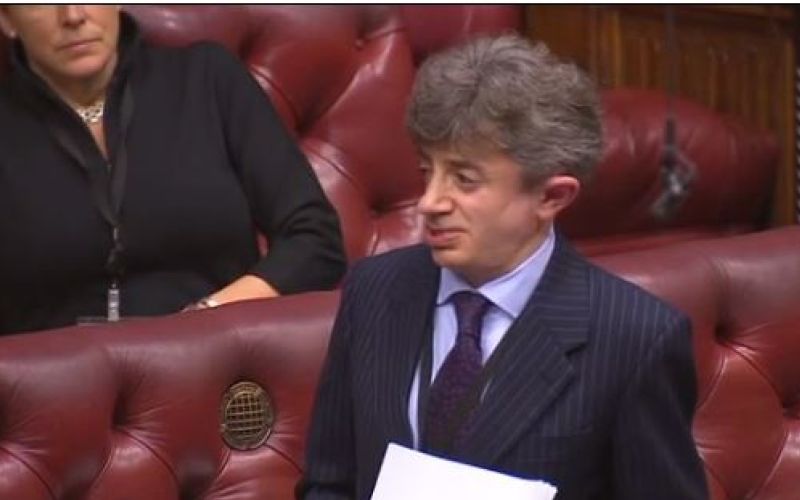A disabled Conservative peer has accused the government of a possible cover-up, over the equality watchdog’s failure to appoint him as its disability commissioner.
Lord [Kevin] Shinkwin spoke out in parliament on Friday (24 November) about what he said was the “shocking” behaviour of the Equality and Human Rights Commission (EHRC).
But he also said he now believed that the women and equalities minister Justine Greening had been involved in the process that led to the abolition of the role of disability commissioner.
And he has told the prime minister that he will resign the Conservative whip and work instead as an independent crossbench peer if she does not write to EHRC chair David Isaac to ask him to “reinstate the position of disability commissioner, to appoint me, in that capacity, chair of the commission’s disability advisory committee and to allow me to lead in the recruitment of new members to that committee”.
Lord Shinkwin (pictured) is refusing to attend board meetings in protest at the commission’s decision to appoint him as a general commissioner, when he had applied for the role of disability commissioner.
He had applied last year for the post of disability commissioner but was told months later – just 36 hours before his first board meeting – that the role had been made redundant and that he had instead been appointed as a general commissioner and would not lead on disability issues.
He told fellow peers that he had asked the prime minister to release written evidence to show that Greening “did not collude in weakening the voice of disabled people… by helping to set in train the process to remove the position of disability commissioner”.
If he did not receive this evidence, he said, he would have to reach the conclusion that Greening “has allowed the position of disability commissioner to be abolished on this government’s watch” and had “acted in flagrant dereliction of her duty to me as a disabled person and to all disabled people”, and that she should therefore resign.
Lord Shinkwin suggested to fellow peers, during a debate on a new bill that would improve access for wheelchair-users (see separate story), that the decision to appoint him as a general commissioner – rather than as the commissioner leading on disability issues – was only made after the commission had learned that he had been selected for the role by Greening.
And he added: “All the evidence I have seen points to the fact that the equalities minister, Justine Greening, was involved in the process that led to the abolition of the position of disability commissioner.”
He told Disability News Service (DNS) later that unless all the written communications involving Greening’s department and EHRC was released there would be “strong grounds for suspecting a cover-up”.
The commission insists that it had decided there was no need for a disability commissioner because of the decision to “mainstream” disability into its work.
Isaac has previously told MPs on the Commons women and equalities committee that, during the gap of several months between the interviews for the post, last December, and Greening’s decision to appoint Lord Shinkwin in April, the statutory disability committee had “expired” and the board had decided that the post of disability commissioner should also be scrapped.
Rebecca Hilsenrath, EHRC’s chief executive, told the committee it was “a matter of fact” that Greening had appointed him as a general commissioner and not a disability commissioner.
The home office minister Baroness Williams told peers on Friday that “the roles and responsibilities given to board members of the Equality and Human Rights Commission are matters for the commission itself, and the government have no power to reinstate the EHRC’s disability commissioner role”.
But Lord Shinkwin told DNS this week that he believed Greening should have “lobbied strongly” for the commission to appoint him as disability commissioner, and that disabled people had now “lost their last powerful voice” because of the abolition of the role.
He said: “No equalities minister should have acquiesced in that. Had she objected strongly, I think we’d still have a disability commissioner.
“Indeed, I believe that was very much the plan until they heard who was going to be appointed to the role.”
He also shared the letters he has exchanged with the prime minister.
Theresa May told him in her letter that the government “had no involvement in the EHRC’s decision to abolish the Disability Commissioner role” and insisted that Greening had appointed him in the expectation “that you would bring your passions, skills, experience and knowledge of disability, and help to drive forward the EHRC’s work on disability discrimination”.
In his reply, he notes his “dismay” at the contents of her letter, and says the evidence he has sent her “clearly demonstrates that the Government was aware of plans to abolish, and was complicit in the abolition of, the post of Disability Commissioner”.
In his letter, he calls the commission’s decision to abolish the disability commissioner role “grubby” and “underhand”.
And he says he has been a member of the Conservative party for nearly 30 years, but that her reluctance to “engage with the damning evidence I have put before you… leads me to the reluctant conclusion that there is nothing more I can do to defend our Party’s hard-won credibility on disability rights”.
He adds: “I want so much to help rebut unfair charges of our being – as you yourself once described us – ‘the nasty Party’, but the rug has been pulled from under the wheels of my chair.”

 Equality watchdog must investigate ‘urgent threat’ posed by Labour policies, say DPOs
Equality watchdog must investigate ‘urgent threat’ posed by Labour policies, say DPOs Disabled peers speak of ‘daily fight’ against access barriers in House of Lords
Disabled peers speak of ‘daily fight’ against access barriers in House of Lords